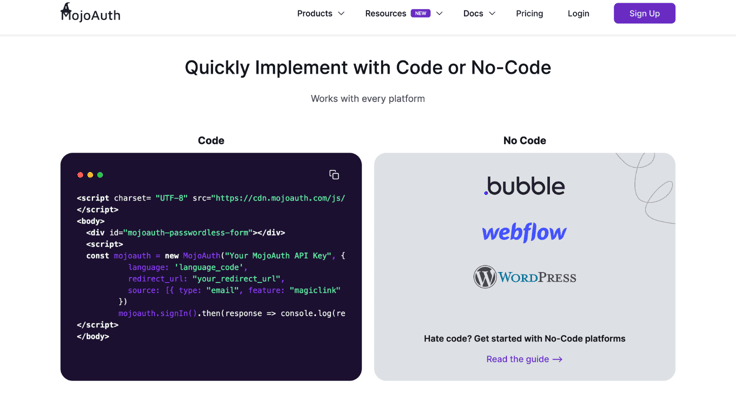
TL; DR: MojoAuth is on a mission to eliminate passwords with its personalized passwordless experience. Its user-friendly software provides passwordless multifactor authentication that uses magic links, biometrics, and one-time passcodes to log in. MojoAuth makes identity/access management secure and convenient. It is also easy to integrate and onboard. We spoke with Dev Kumar, Co-Founder of MojoAuth, about the platform and the future of authentication.
“You’re only as good as your weakest link.” This statement couldn’t be more accurate in the world of cybersecurity. Passwords, in the case of cybersecurity, are the weakest link. Although passwords are a user-friendly authentication method, they can be one of the least secure ways to protect your accounts and data.
According to GoodFirms, 30% of users surveyed said they have experienced a data breach due to weak passwords. About 46% of people said they reuse their passwords across multiple platforms, and 53% reported sharing them with friends, family, and colleagues. These stats show that password vulnerabilities are everywhere, primed for bad actors to enter and steal valuable information.
Although managing passwords can be a pain, other security methods may seem too complex or inaccessible to many people. MojoAuth seeks to do away with this preconception and make passwordless authentication simple and convenient.

“Typing passwords is cumbersome, especially on mobile. Passwordless removes this hurdle. A quick biometric scan or verifying a magic link sent to an email provides faster, smoother access, improving the user experience significantly,” said Dev Kumar, Co-Founder of MojoAuth.
MojoAuth uses frictionless multifactor security that relies on biometrics, hardware tokens, and magic links, which are far more difficult to compromise than passwords. MojoAuth’s authentication method is user-friendly and easy to integrate into any setup or system. It is also phishing-proof, so companies don’t have to worry about their employees being duped into clicking on the wrong links.
Security and Convenience Can Go Hand in Hand
The MojoAuth team has built innovative and developer-friendly software to help users log into their accounts without passwords. After an initial private beta and beta launch, MojoAuth received great feedback from businesses and users. Now top brands, including Dell, Social9, and HelloScribe, trust MojoAuth to secure their access management.
“Solutions like MojoAuth integrate passwordless or social login options. This removes the burden of password management from users, leading to less frustration and fewer help desk tickets for password resets,” said Dev.
Passwords are often seen as the easiest authentication method. But MojoAuth seeks to do away with this outlook by creating a seamless and smooth passwordless experience. MojoAuth uses easy-to-navigate factors, including magic links and one-time passcodes, to make logging into accounts effortless and secure. Its software is also super easy to integrate because of its API framework.

“API-based solutions easily integrate into existing tech stacks, making them ideal for diverse B2B and B2C use cases. They can adjust to evolving security threats and user preferences, something rigid password systems can’t,” said Dev.
Teams can also customize MojoAuth’s user interface design to meet their needs. Dev said businesses can create a seamless visual experience across their websites and solutions to strengthen their brand identity and build trust with end users. MojoAuth is here to be at the convenience of its customers.
“A customized UI feels like a natural extension of the customer’s platform rather than a disjointed add-on. This fosters a more cohesive experience for their users, reducing friction and potential confusion,” said Dev.
Eliminating the Need for Credential Stores
Passwords are not as effective as they were in the early days of the internet. More threats live online, and passwords are vulnerable to hacking, phishing, and the age-old problem of human forgetfulness. MojoAuth is here to eliminate the need for login credential stores.
“Credential stores are a prime target for hackers. By removing them from the equation, you drastically shrink the potential attack vectors, enhancing your overall security posture,” said Dev.
With MojoAuth, companies won’t have to worry about password managers and changing passwords every so often. Dev said credential leaks can happen even with the best security. MojoAuth takes the burden off IT teams and ensures sensitive data never gets compromised.
“Managing secure credential storage requires specialized infrastructure, software, and ongoing maintenance. Outsourcing this responsibility reduces IT complexity and costs. Minimizing stored credentials – especially passwords – also streamlines compliance efforts with regulations like GDPR and PCI DSS,” said Dev.
Dev told us that moving away from login credentials reflects the evolution of identity management. Passwordless solutions prove to be a more secure, scalable, and user-friendly solution. MojoAuth’s multifactor authentication also helps with the growth of remote work.
“Hackers now actively target remote workers, knowing they often have less robust security. MFA, especially with adaptive features that analyze login context, thwarts attacks that would slip past a simple password,” said Dev.
Private Cloud vs Public Cloud
MojoAuth also provides a private cloud offering. Cloud resources are in high demand for their scalability, accessibility, and innovative nature. Although public cloud providers, such as AWS and Azure, have their benefits, the private cloud brings another element to the table.
“Private clouds can be fine-tuned for specific workloads, sometimes yielding better performance and control over latency compared to shared public cloud resources,” said Dev.
Dev told us private clouds can better bridge the gap between modern cloud architecture and legacy systems that may be difficult to migrate to public cloud environments. The private cloud can also provide excellent security and customization.
“Private clouds reside within an organization’s network (on-premises or dedicated provider), providing full customization of resources and security policies. Private clouds also offer greater isolation, vital for handling highly sensitive data with strict compliance requirements,” said Dev.
The Future of Authentication is Passwordless
Innovation is at the heart of everything MojoAuth does. As it happens, the team has some new developments underway. MojoAuth is developing a new solution for modern passwordless authentication with legacy systems. It will allow companies to leverage passwordless solutions without overhauling their legacy infrastructure.
“We’re also building an intelligent MFA engine that analyzes user behavior, device context, and real-time threat data to adjust authentication requirements dynamically. This means a seamless login experience for low-risk scenarios and heightened security when anomalies are detected,” said Dev.
The MojoAuth team is also exploring new pathways for authentication. MojoAuth seeks to provide decentralized identity solutions powered by blockchain to give users more control over their digital identities in the Web3 era. The team is also researching behavioral biometrics, factors such as typing patterns and device usage, to add an extra layer of security that constantly verifies user identity in the background.
“Our goal is to stay ahead of the curve, delivering cutting-edge authentication solutions that aren’t just secure but genuinely user-friendly. We see passwordless not as a niche trend but as the future of authentication. It provides a future where security and convenience aren’t at odds but go hand in hand,” said Dev.


